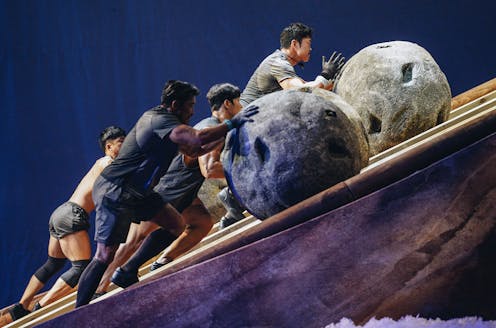From Squid Game and Physical: 100 to K-pop and BTS, translation is central to tectonic shifts in global cultural consumption
- Written by Jinhyun Cho, Senior Lecturer in Translation and Interpreting at Macquarie University, Macquarie University

The Korean reality survival show Physical: 100 has become a global hit, topping Netflix’s non-English lineup in just a week following its premier on January 24 2023.
The name of the show says it all: 100 contestants with superb physiques participate in a variety of challenges to win 300 million Korean won, equivalent to A$335,000.
There are several reasons behind the success of the show. First, the idea of finding the fittest body through a series of gruelling real-life challenges is unprecedented.
Second, the show is reminiscent of another Korean entertainment success, Squid Game. From the studio settings to the ways the challenges operate, Physical: 100 has obviously been inspired by its fictional blockbuster predecessor. Third, the sheer scale of the challenges – such as moving a 1.5-tonne ship – is just mindboggling.
There is one element that is rarely talked about, despite its pivotal contribution to the success of the show: translation.
Without translation, the show would never have been able to reach a global audience. The same goes for all the Korean dramas, movies and shows that have gained huge popularity around the world. Translation is central to tectonic shifts in global cultural consumption, which has been traditionally led by the West.
The rise of Korean culture as a gamechanger
For decades, people in the East have looked to the West (mostly the United States and Europe) as a source of cultural consumption. Korea was no exception.
Local movies were once looked down upon by Korean people, who considered Western counterparts more advanced. It was not until the late 1990s that the Korean movie industry began to thrive, thanks largely to systematic government support.
Another contributor to the global popularity of Korean culture is the ascendance of Korean pop culture, better known as K-pop. This new genre of visually packed musical performance has benefited enormously from YouTube and has produced global household names such as BTS and Black Pink. As of 2021, the number of K-culture fans was estimated at more than 150 million.
Who translates Korean cultural products?
The rise of Korean culture has witnessed a rapid growth of a dedicated global fandom and, interestingly, fan-led translation. Initiated by BTS fans, an enormous community also known as “Army”, fandom translation basically covers everything relating to their favourite artists. From YouTube videos and lyrics to news articles, fans from around the world who are proficient in the Korean language voluntarily translate it all into other languages and share them through social media.
Paid translation work is in demand too. Iyuno SDI, for example, provides translation services in more than 100 languages to global media companies such as Netflix, Disney and Amazon. It is, however, not always humans who translate: AI-enabled machine translation (XL8) does much of the work. Draft translation done by machines is then reviewed and edited by more than 30,000 freelance translators across the world.
Despite the growth of the translation industry, working conditions for translators are often problematic, as many translators are short of time to complete work and underpaid. Through this mass production process, cultural consideration may sometimes get lost, as happened in Physical: 100.
Translation challenges in Physical: 100
If you’ve watched the show, you will remember Choo Sung-Hoon, a celebrity mixed martial arts (MMA) fighter. After Choo won his first one-on-one match against another MMA fighter, Shin Dong-Kook, Shin bowed deeply before Choo, with his head touching the ground. Is this standard practice among MMA fighters? No, the answer lies in the Korean term, sunbae-nim, which Shin used consistently to refer to Choo, but was not translated in the show.
Sunbae-nim refers to a person who is older or more experienced in a workplace, school, military unit or social context. Virtually all Koreans would know several people whom they consider as sunbae-nim.
Shin clearly idolises Choo, who is older and has been a big gun in the MMA field for almost two decades. It is therefore only natural for Shin to call Choo sunbae-nim, a term intended to deliver the amount of respect that Shin held for Choo. As there is no exact English equivalent, however, the term was often replaced in the subtitles by Choo’s given name, “Sung-Hoon”.
This might have given the wrong impression when Shin suggested to Choo that they have an MMA match, rather than playing the ball game prescribed in the show. Here is what Shin said (in the English subtitles) when he made the suggestion:
It would be rude of me to challenge a respected senior just to play with a ball.
“Respected senior” here refers to dae-sunbaenim (literally “great sunbaenim”) yet it sounds odd and unnatural. My suggestion? “It wouldn’t do justice to your distinguished MMA career if we just played with a ball.”
Read more: Squid Game and the 'untranslatable': the debate around subtitles explained
Translation as a mutual process
Titles and forms of address in Korean are always challenging to translate.
As someone who specialises in English-Korean translation, I believe it would be best to retain these original expressions. In this digital era, information is at one’s fingertips and is easy to look up. Just as “señor” or “monsieur” need no translation, Korean titles should be respected on their own terms.
When we recognise translation as a mutual process of engaging with an audience, a cultural shift from the West to the East may be achieved in a genuine sense.
Authors: Jinhyun Cho, Senior Lecturer in Translation and Interpreting at Macquarie University, Macquarie University





